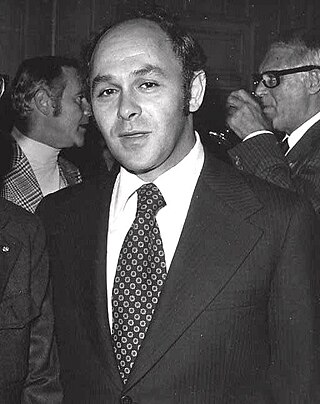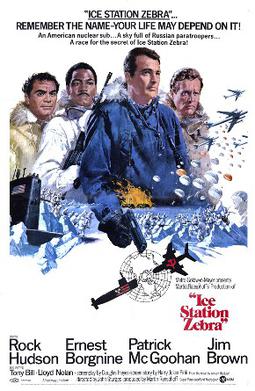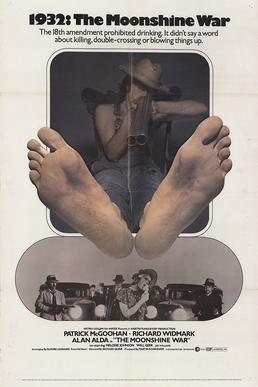Related Research Articles

Metro-Goldwyn-Mayer Studios Inc., is an American media company specializing in film and television production and distribution based in Beverly Hills, California. It was founded on April 17, 1924 and has been owned by the Amazon MGM Studios subsidiary of Amazon since 2022.

United Artists Corporation (UA) was an American production and distribution company founded in 1919 by Charlie Chaplin, D.W. Griffith, Mary Pickford and Douglas Fairbanks as a venture premised on allowing actors to control their own financial and artistic interests rather than being dependent upon commercial studios.

Kerkor "Kirk" Kerkorian was an Armenian-American businessman, investor, and philanthropist. He was the president and CEO of Tracinda Corporation, his private holding company based in Beverly Hills, California. Kerkorian was one of the important figures in the shaping of Las Vegas and, with architect Martin Stern Jr., is described as the "father of the mega-resort". He built the world's largest hotel in Las Vegas three times: the International Hotel, the original MGM Grand Hotel (1973) and the current MGM Grand (1993). He purchased the Metro-Goldwyn-Mayer movie studio in 1969.

Frank Yablans was an American studio executive, film producer, and screenwriter. Yablans served as an executive at Paramount Pictures, including President of the studio, in the 1960s and 1970s.
The Shoes of the Fisherman is a 1968 American epic political drama film directed by Michael Anderson, based on Morris West’s 1963 novel of the same name about Vatican and Cold War politics. The film stars Anthony Quinn, Oskar Werner, David Janssen, Vittorio De Sica, Leo McKern, John Gielgud and Laurence Olivier.
Elliott Kastner was an American film producer, whose best known credits include Where Eagles Dare (1968), The Long Goodbye (1973), The Missouri Breaks (1976), and Angel Heart (1987).
Herbert Franklin Solow was an American motion picture and television executive, screenwriter, motion picture and television producer, director and talent agent.

The Strawberry Statement is a 1970 American drama film set in the counterculture and student revolts of the 1960s. The story is loosely based on the non-fiction book of the same name by James Simon Kunen about the Columbia University protests of 1968.

The Carey Treatment is a 1972 American crime thriller film directed by Blake Edwards and starring James Coburn, Jennifer O'Neill, Dan O'Herlihy and Pat Hingle. The film was based on the 1968 novel A Case of Need credited to Jeffery Hudson, a pseudonym for Michael Crichton. Like Darling Lili and Wild Rovers before this, The Carey Treatment was heavily edited without help from Edwards by the studio into a running time of one hour and 41 minutes; these edits were later satirized in his 1981 black comedy S.O.B..

Ice Station Zebra is a 1968 American espionage thriller film directed by John Sturges and starring Rock Hudson, Patrick McGoohan, Ernest Borgnine, and Jim Brown. The screenplay is by Douglas Heyes, Harry Julian Fink, and W. R. Burnett, loosely based on Alistair MacLean's 1963 novel. Both have parallels to real-life events that took place in 1959. The film concerns a US nuclear submarine that must rush to the North Pole to rescue the members of the Ice Station Zebra.
Frank E. Rosenfelt was an American executive who served as CEO of Metro-Goldwyn-Mayer (MGM) studio under MGM owner Kirk Kerkorian from 1972 until 1982. Additionally, Rosenfelt spearheaded the acquisition of United Artists by MGM in 1981.

The Moonshine War is a 1970 American crime comedy-drama film directed by Richard Quine, based on the 1969 novel of the same name by Elmore Leonard. It stars Patrick McGoohan, Richard Widmark, Alan Alda, and Will Geer.

The King's Thief is a 1955 swashbuckling CinemaScope adventure film directed by Robert Z. Leonard, who replaced Hugo Fregonese during filming. Released on August 5, 1955, the film takes place in London at the time of Charles II and stars Ann Blyth, Edmund Purdom, David Niven, George Sanders and Roger Moore.
James Thomas Aubrey Jr. was an American television and film executive. As president of the CBS television network from 1959 to 1965, with his "smell for the blue-collar," he produced some of television's most enduring series on the air, including Gilligan's Island and The Beverly Hillbillies.
Robert M. Weitman (1905–1989) was an American film, TV and theatre producer and studio executive. For a number of years he was a leading executive at Metro-Goldwyn-Mayer, being head of production during a successful period in the 1960s under president Robert O'Brien. The two men oversaw the production of the last consistent run of classic films at the studio.
Robert H. O'Brien (1907–1997) was a businessman and Hollywood executive who was president of Metro-Goldwyn-Mayer during the 1960s.
Joseph Richard Vogel was an American executive best known for his stint at Metro-Goldwyn-Mayer, including a reign as president from 1956 to 1963.
MGM-Pathé Communications was an American film production company that operated in Los Angeles County, California from 1990 to 1992.
Fade Out: The Calamitous Final Days of MGM is a 1990 non-fiction book by Peter Bart which covers the history of MGM since 1969, when it was bought by Kirk Kerkorian. Bart was an executive at MGM in 1983 and 1984. The book focuses on the regimes of James T. Aubrey, Daniel Melnick, David Begelman and Frank Yablans.
Fred Benninger (1917–2004) was a German American businessperson who was a close advisor to billionaire Kirk Kerkorian. He served as a top executive at several companies controlled by Kerkorian, including Metro-Goldwyn-Mayer, Western Airlines, and MGM Grand, Inc.
References
- ↑ "Leisure Dynamics Elevates Louis F. Polk Jr. to Chairman". Dayton Daily News . June 9, 1971. p. 63. Retrieved December 30, 2018– via Newspapers.com.

- ↑ "Controller Elevated By General Mills, Inc". The New York Times . November 28, 1961. p. 50.
- ↑ "Hints to Attitude of Bo Polk Seen In Fortune Piece". Variety . January 15, 1969. p. 3.
- ↑ SLOANE, LEONARD (November 28, 1968). "M-G-M Committee Picks an Engineer As Top Executive: A NEW EXECUTIVE ELECTED BY M-G-M". The New York Times . p. 75.
- ↑ "Polk Apparently Picked As Top MGM Officer By Selection Committee: Special Meeting of Board Slated Wednesday, When General Mills Officer Is to Be Put on Board". Wall Street Journal . November 29, 1968. p. 24.
- ↑ PENN, STANLEY (December 5, 1968). "Bronfman's Struggle to Install MGM Chief Seen Set Back by Delay of Annual Meeting". Wall Street Journal . p. 4.
- ↑ "Polk, 38, Elected President of MGM as Bronfman Wins Wood". Charles D. Los Angeles Times. Dec 11, 1968. p. d11.
- ↑ LEONARD SLOANE (Dec 11, 1968). "M-G-M Puts Polk In Director's Post With Top Job Next: M-G-M PUTS POLK IN DIRECTOR'S JOB". New York Times. p. 65.
- ↑ "MGM Had Loss Of $2.5 Million In First Period: Substantial Write-Offs' Are Taken on Certain Films; Revenue and Rentals Drop Firm Had Year-Earlier Profit". Wall Street Journal . January 13, 1969. p. 10.
- ↑ "Brisk Winds of Change Rustle Hollywood Champlin, Charles". Los Angeles Times. Feb 23, 1969. p. t1.
- ↑ LEONARD SLOANE (Apr 13, 1969). "A New Roar Coming From M-G-M Lion: A New Roar Being Heard From M-G-M's Offices". New York Times. p. F1.
- ↑ LEONARD SLOANE (May 27, 1969). "M-G-M Says Loss in Year Could Rise to $19-Million: Will Omit a Dividend -- Chairman Resigns in Favor of Bronfman $19-MILLION LOSS IS SEEN AT M-G-M". New York Times. p. 61.
- ↑ "MOVIE PRODUCTION PLANS TOLD BY MGM". Los Angeles Times. Aug 4, 1969. p. d23.
- ↑ "'Taipan' Axed by New MGM Regime". Los Angeles Times. Nov 6, 1969. p. f14.
- ↑ "Movies: Herbert Solow Strives to Leave His Mark at MGM Herbert Solow and MGM Warga, Wayne". Los Angeles Times. Aug 31, 1969. p. j20.
- ↑ Dallos, Robert E. (Aug 12, 1969). "Kerkorian Reports 1,325,000 Shares of MGM Tendered: KERKORIAN". Los Angeles Times. p. b8.
- ↑ LEONARD SLOANE (Oct 22, 1969). "Aubrey Named M-G-M President: Kerkorian Moves In as Bronfman and Forces Lose Out AUBREY IS NAMED M-G-M PRESIDENT". New York Times. p. 57.
- ↑ Dallos, Robert E. (Nov 20, 1969). "MGM Suffers Loss of $35.3 Million for Year: Additional Inventory Write-Downs Blamed; Aubrey Vows Changes MGM LOSS". Los Angeles Times. p. e15.
- ↑ Dallos, Robert E. (Dec 18, 1969). "Polk Files $4 Million MGM, Kerkorian Suit: Charges Coercion Used on Board to Force Dismissal MGM SUIT". Los Angeles Times. p. c14.